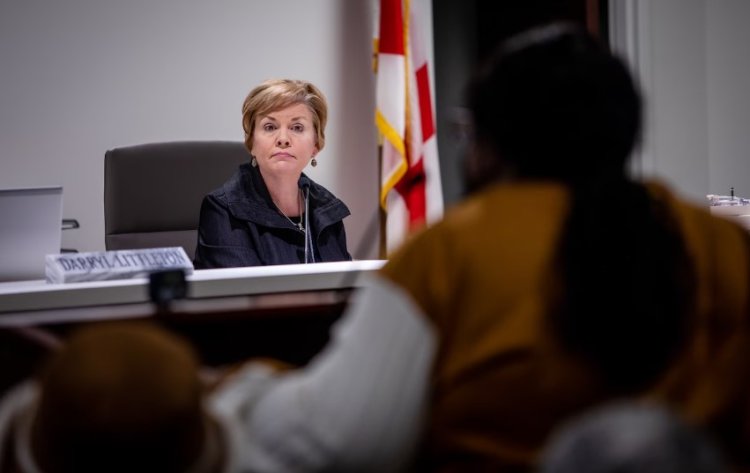Roy S. Johnson: For Genuine Parole Reform, Gwathney Must Step Down
Leigh Gwathney cannot be enjoying her job. She is a public servant doing a disservice to the people of Alabama—and seemingly to herself as well. Her actions are embarrassing our state, which has already endured more than its share of public servant embarrassments.

Leigh Gwathney cannot be enjoying her job.
She is a public servant doing a disservice to the people of Alabama—and seemingly to herself as well.
Her actions are embarrassing our state, which has already endured more than its share of public servant embarrassments.
Gwathney’s approach is callous, dismissing compassion and common sense, and unfairly denying parole to too many individuals who have paid their dues.
Her decisions are undermining justice, showcasing the worst of our inhumanity.
This cannot be enjoyable for her. So why does she stay?
For the sake of those whose lives are in her hands—and for herself—the stubborn chair of the Alabama Board of Pardons & Paroles should step down immediately.
At the very least, Gov. Kay Ivey should not re-appoint Gwathney when her term expires next year.
Just let her go.
Unfortunately, the governor may not see the need to correct this injustice, since she is the one who appointed Gwathney in the first place.
Ivey appointed Gwathney, a product of our harsh state attorney general’s office, as chair in October 2019, shortly after the state legislature passed a new law to "reform" the board by transferring the power to appoint members to the Lieutenant Governor, Speaker of the House, and Senate President Pro Tempore.
However, this so-called reform quickly turned into a reversal of parole policies—a gross overreaction to the murder of three people by Jimmy O’Neal Spencer, who had been paroled the previous year. Almost immediately, the board ground to a halt, as detailed by the groundbreaking reporting of AL.com colleagues Ivana Hrynkiw and John Archibald in their series "Denied: Alabama’s Broken Parole System."
Just two years prior, the board had granted parole to more than half (54%) of the applicants. Many were elderly and posed no threat, according to the board’s guidelines. Some were already participating in work release programs.
Yet, with Gwathney's arrival, the grant rate plummeted to 31% in her first year, then 20% in 2020, 15% in 2021, 10% in 2022, and a mere 8% in 2023—just 297 paroles out of 3,583 hearings. This defied the board’s own recommendation that about 80% of applicants should qualify for release.
Gwathney overwhelmingly votes no at a much higher rate than fellow board members Darryl Littleton and Gabrielle Simmons, often postponing another hearing for the maximum allowed five years.
Thus, we have "The Gwathney Effect."
Creating a non-parole parole board was evidently Ivey’s intent. Upon signing the bill, she said, “The paramount duty of this board is to protect and instill confidence in public safety.”
This, despite the state being sued in 2020 by the U.S. Department of Justice for having unconstitutionally horrific, overcrowded, understaffed, and dangerously violent prisons.
The governor and state lawmakers will spend over $1 billion on a new 4,000-bed prison in Elmore County, scheduled for completion in 2026, while plans for a second prison in south Alabama remain unfinished. However, this will not address overcrowding as older facilities will be shut down, adding no new beds.
The system remains 69% over capacity and is headed for a legal showdown with the Justice Department.
Last week, state lawmakers feigned ignorance about their own role in this mess. At a Joint Prison Oversight Committee meeting in Montgomery, citizens shared horror stories of loved ones being unfairly denied parole.
One anguished mother said, “... once they put you in there, they throw the key away. You’re stuck for life.”
Yet members shrugged, deflected, and pointed to Ivey rather than acknowledge the unnecessary law they passed, ceding their powers to the governor.
Rep. Jim Hill, R-St. Clair County, said, “The day-to-day operations of the parole board are not supervised, they are not directed by the legislative branch of government.”
He added that the board “ought to be here.” But Sen. Clyde Chambliss, R-Autauga County, excused their absence by apologizing for giving the board only 30 days' notice.
“I will get them an invitation earlier next time,” he said.
Gwathney appears to be unraveling under scrutiny. At a recent hearing over the parole of Willie Conner, who has served over 12 years for stealing a roofing nail gun from a Lowe’s in Foley, she engaged in a grating legal argument with former Alabama Supreme Court Chief Justice Roy Moore, as if she were a first-year law student.
“People want justice,” Moore later told Ivana Hrynkiw. “They want bad people to stay in, they want people that are worthy of parole to get out. That’s the system. That’s what it’s supposed to be. But that’s not what it’s been. What it’s been is a representative of the attorney general’s office controlling the parole board in my opinion.”







